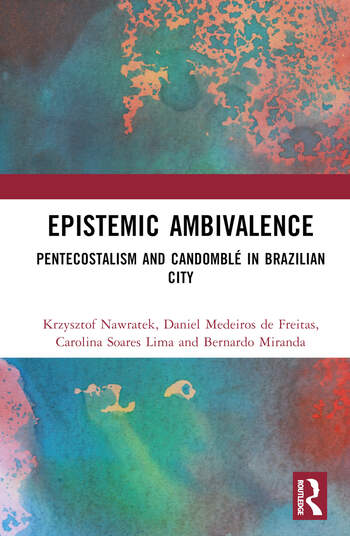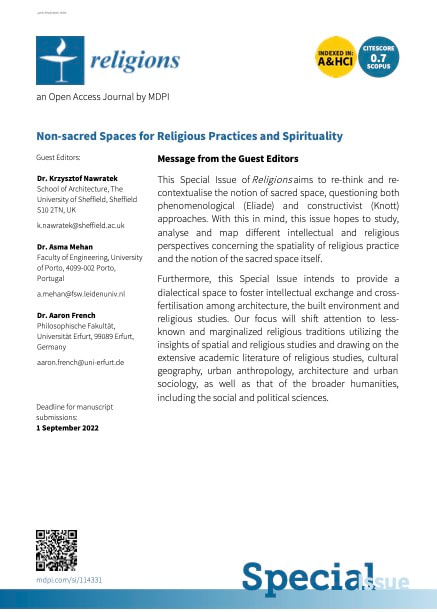|
Forthcoming book! (October 2023)
Our book, Epistemic Ambivalence. Pentecostalism and Condomble in Brazilian City will be published in October 2023 by Routledge. It received very positive comments from leading scholars in the field: “Epistemic Ambivalence. Pentecostalism and Candomblé in Brazilian city” offers a fascinating and nuanced account of Candomblé and Pentecostal churches in Belo Horizonte, Brazil. By exploring the parishioners’ sense of place and especially their appeals to various sources of epistemic capital, this transdisciplinary work challenges conventional theories of urban spaces and makes an intriguing contribution to larger discussions in the study of post-secularism as well as decolonial urban theory. It will necessarily be appealing to a range of scholars in urban theory and religious studies." -Jason Ānanda Josephson Storm, Professor of Religion, Chair of Science & Technology Studies, Williams College "Epistemic Ambivalence: Pentecostalism and Candomble in the Brazilian City is a necessary disruptor to the field of Religious Studies. From its collaborative, inclusive and interdisciplinary composition to its embrace of new spacial, material and epistemic models, the authors have given us an exemplar of decolonisation and inclusivity. Not merely an account of religious diversity and change, Epistemic Ambivalence is an example of how the study of religion itself must change." -Dr David Robertson, The Open University “This book presents and demonstrates a new framework for analyzing the presence of religion in urban spaces. It questions the popular sacred-profane dialogue and inaugurates a new type of engagement based on the repertoire or epistemic capital of city dwellers in Brazil. This is a very sensitive and sympathetic approach to the study of lived experiences of the urban population. The result is a refreshing analysis that navigates epistemic ambivalences with internal understanding. It is a book that will remain popular for a long time.” -Olufunke Adeboye, Professor of History & Dean of Arts, University of Lagos, Nigeria February 2023
Religions CFP- Non-sacred Spaces for Religious Practices and Spirituality Dear Colleagues, This Special Issue of Religions aims to re-think and re-contextualise the notion of sacred space, questioning both phenomenological (Eliade) and constructivist (Knott) approaches. With this in mind, this issue hopes to study, analyse and map different intellectual and religious perspectives concerning the spatiality of religious practice and the notion of the sacred space itself. Furthermore, this Special Issue intends to provide a dialectical space to foster intellectual exchange and cross-fertilisation among architecture, the built environment, and religious studies. Our focus will shift attention to less-known and marginalized religious traditions utilizing the insights of spatial and religious studies and drawing on the extensive academic literature of religious studies, cultural geography, urban anthropology, architecture and urban sociology, as well as that of the broader humanities, including the social and political sciences. The goal of the Special Issue is to resituate the now largely discarded historiographical concept of sacred space within the context of an apparently secular, rationalized, pluralistic, and globalized modern world and to ask “How does this concept—or does it—remain generative and how has it been reimagined, repurposed, and reinscribed with new and surprising meanings in order to fit the changing historical situation?” To achieve this, our focus is intentionally interdisciplinary, bringing together different discourses and specialists to go beyond traditional academic disciplinary aggregations. Such an approach was devised with the intent of evolving our understanding of the concept of sacred space outside of phenomenological and constructivist lenses, in hopes of germinating fresh interpretations on the type of space that is and has been referred to as “sacred” in the present and past. The issue will supplement the already existing reorientation in religious studies that have been ongoing for the last three decades, namely, material and spatial turns, which seek to interpret religious phenomena outside the traditional categories of dogma, belief, and ritual practice, focusing instead on configurations of space and relations, how religions ideas are lived out in a concrete way and how they are instantiated materially and socially. As an interdisciplinary issue, we hope this collection of research will also contribute to building bridges between academic disciplines, will the aim of reinvigorating dialogue between religious studies and built-environment-related disciplines. Dr. Krzysztof Nawratek Dr. Asma Mehan Dr. Aaron French Guest Editors 2019 - ongoing
Spatial practices of members of Pentecostal Churches in Belo Horizonte, Brazil (before and during COVID-10 pandemic) There are two different forces shaping the way spaces are perceived and used by believers of Pentecostal churches, when the spaces for solitude are as important as spaces for gathering. There are differences between different Pentecostal churches concerning the spatial and visual language they adopt, but in general there is a tendency to attribute personal spaces with ‘practicing faith’ while churches are understood as places to ‘manifest faith. There is therefore a tendency of members of Pentecostal movement to ‘withdraw’ from public life beyond activities related to or organised by a church. The project investigate what spaces, how and why are used by members of Pentecostal churches in Belo Horizonte. The Project started in 2019, in 2020 COVID-10 context was added as a particular context. |


